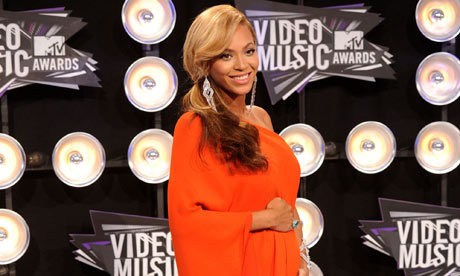
When are you having a baby? Are you going back to work? These are the questions that assail women of childbearing age like twin buzzards trying to tear off strips of your firm, young, reproductively primed flesh. And it doesn't make any difference whether you work in a call centre, a classroom or in the centre of a dazzling multimedia entertainment empire – it's always the same. The message of those questions is that procreation is the only interesting or significant thing a woman can do.
Witness Beyoncé. After she announced her pregnancy at the MTV Video Music Awards this week, she was greeted with headlines such as "Is the show over?" in the Independent. Obviously, the birth of a child is fairly physically demanding, and no one expects our girl B to be working it out onstage at 38 weeks gestation with a team of obstetricians in the wings. But a few months off, or even a couple of years, isn't the same as giving up a career altogether.
Most mothers find that there are some obstacles to going back to work. Childcare can be difficult to arrange (and the fact that women tend to drop out of employment to have babies gives sustenance to the pernicious habit of couples weighing childcare costs only against her earnings rather than his as well). Still, Beyoncé earned $35m last year (according to the Forbes celebrity rich list), while her husband Jay-Z brought home another $37m. Even at Hollywood rates, it's hard to imagine Mr and Mrs Hova sitting at home over a spreadsheet, struggling to find nursery fees in the household budget. ("Well, maybe if you can get one more L'Oreal endorsement, we'll be able to put down the deposit on a place in daycare.")
So it makes no sense at all to speculate about this being the end of Beyoncé's reign as the queen of R&B. Even the teasing mention of resignation on which the Indy's story is built reads more like a refutation in the context of the two-month-old interview it comes from. "I always said I'd have a baby at 30. But I also said I'm going to retire at 30 … Only God knows," she told Piers Morgan. Asked to parse that comment, I'd probably come up with something like "I'm definitely not retiring, so don't order the nappy cake". But for some people, it doesn't matter what you accomplish in your life: the only question worth asking of a human with a uterus is when they plan on expelling another living being from it.
It doesn't matter if you're responsible for at least three of the 10 most intoxicatingly danceable singles of the last decade, or that you've convinced the globe that "bootylicious" is an actual word that can be said without shame. It's irrelevant that you've answered Gaga's very Telephone itself – with all that on your CV, there are still people who suppose that the private business of bearing a child and raising a family marks some sort of full stop on a woman's contribution to the world. (No one seems to be suggesting that this might be the end of Jay-Z's career, of course. Motherhood is a vocation; fatherhood is patronisingly downgraded to a sideline.)
The extra stupid part is that, despite the assumption that birth is the end, it really isn't. According to the Fawcett Society in 2008, 57% of women with children under five are in paid work, increasing to around 80% by the time the youngest progeny reach school leaving age. It's normal for mothers to work – possibly for the very good reason that, contrary to romantic opinion, labour doesn't convert you into a beatific spirit sustained by love alone. Mothers have a right to return to their pre-maternity jobs (or equivalent), and a good thing too, because mothers still need money, they still need connections to the world beyond domesticity, and they might even harbour the odd ambition that can't be satisfied by vicarious finger-painting. Such as, in Beyoncé's case, winning another fistful of Grammies and maintaining dominion over wedding discos for the next generation.

